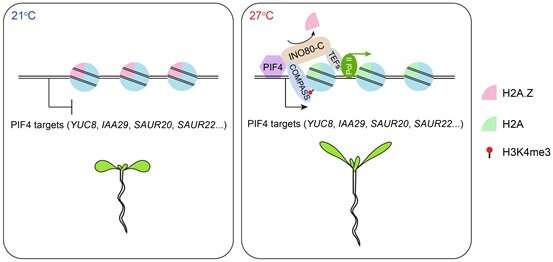Epigenetic mechanism helps plants to live under high temperatures

Global warming imposes a major threat to plant growth and crop production. In many cases, plants could sense the temperature increase and adjust their morphology and development, facilitating plant cooling and warm adaptation. Hence, understanding the mechanisms of these morphological and developmental changes, collectively called thermomorphogenesis, could benefit the breeding of warm-adaptive crops.
Recently, a research team led by Dr. Jiang Danhua from the Institute of Genetics and Developmental Biology (IGDB) of the Chinese Academy of Sciences (CAS) investigated how the model plant Arabidopsis adjusts its growth under high temperatures and discovered a chromatin and transcription-based mechanism in thermomorphogenesis.
The researchers found that a chromatin remodeling complex called INO80 complex (INO80-C) is required for thermomorphogenesis and regulates the chromatin accumulation of a histone variant H2A.Z, which is often associated with the repression of responsive genes.
Moreover, they showed that PHYTOCHROME-INTERACTING FACTOR 4 (PIF4), a potent regulator in thermomorphogenesis, interacts with INO80-C and together mediate high temperature-induced H2A.Z eviction at thermo-responsive PIF4 target genes, leading to their activation when temperature increases.
Using genetic analysis, they found that PIF4 and INO80-C might not only regulate H2A.Z eviction, but also other transcriptional processes under high temperatures.
Therefore, they performed further experiments and found that the INO80-C also interacts with transcription elongation factors and a protein complex called COMPASS-like, which catalyzes modifications at histone H3 such as H3K4me3 to stimulate gene transcription.
Under high temperatures, H3K4me3 and transcription elongation are increased at PIF4 targets, and this is INO80-C and PIF4 dependent.
In addition, several transcription elongation factors are required for thermomorphogenesis and high temperature-induced H2A.Z eviction, suggesting the mutual dependence of H2A.Z eviction and transcription elongation.
This study entitled "The INO80 Chromatin Remodeling Complex Promotes Thermomorphogenesis by Connecting H2A.Z Eviction and Active Transcription in Arabidopsis" was published online in Molecular Plant.
More information: Mande Xue et al, The INO80 chromatin remodeling complex promotes thermomorphogenesis by connecting H2A.Z eviction and active transcription in Arabidopsis, Molecular Plant (2021). DOI: 10.1016/j.molp.2021.07.001
Journal information: Molecular Plant
Provided by Chinese Academy of Sciences


















